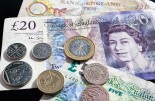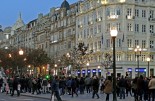Han Dieperink: Rising interest rates affect the economy
Han Dieperink: Rising interest rates affect the economy

This column was written in Dutch. This article is an English translation.
By Han Dieperink, written in a personal capacity
US policy interest rates have risen rapidly in a short period of time, but the full effect on the economy is still to be seen.
There are several reasons why the effect of the rapidly rising policy interest rate on the economy has not yet materialized. For example, it takes an average of 12 to 18 months for interest rate hikes to be fully felt. Moreover, it is not only about the rate of interest rate increases, but also about the absolute level of the interest rate.
As long as the interest rate is below the inflation level, there is in fact still a stimulative monetary policy. However, thanks to the fall in inflation and the further increase in interest rates, policy is now rapidly becoming more restrictive.
The counterproductive consequences of the low interest rate policy
The long period of extremely low interest rates has ensured that many parties with debts have been able to finance them for a relatively long time on favorable terms. As a result, interest rate hikes have much less effect on the economy than before.
In addition, the many interest rate cuts did not lead to more consumption and more investments. Savers actually started saving more to achieve their goal and entrepreneurs stopped investing because of the new normal, of which the low interest rate was a part.
Now that interest rates are normalizing, savers have to save less and entrepreneurs dare to invest again. Here, too, the interest rate hikes have had the opposite effect for the time being.
Implications for the US housing market
This time, especially in the US housing market, there is extreme development. Large parts of this market are locked due to the rapid rise in interest rates. People have their 30-year mortgage financed at 3% or less and lose those terms when they move, as the current 30-year mortgage rate is around 7%. That 7% is also higher than the rental yield of the same home.
In that respect, the world is often turned upside down today. The higher in the capital structure, the higher the remuneration. For example, the earnings yield on equities in the US is below 5%, but the yield on corporate bonds is above 5%. As for the housing market (66% of Americans own their own home), American homeowners often do not see interest costs (on their mortgage) rising, but interest income on their savings does.
So here too, on balance, there is a stimulating policy, although the consumer has nowhere to go because of the low interest rates that are linked to the house. This also means that if the Fed wants to boost the economy again by lowering interest rates, they will not have to count on the housing market for the time being.
Also consider that 38% of Americans own a home, but no mortgage. Add to that the recovery in the stock market and the increase in interest rates will not be felt by large parts of the (US) economy or will even have positive effects.
Will Fed policy cause a recession?
The Federal Funds rate is likely to be raised by a quarter this week to 5.25-5.50%. Only in recent months has the key interest rate been above inflation, partly thanks to the sharp drop in inflation. This also shows a positive effect for the economy. Interest rates are raised because of inflation. And because of inflation, aided by a tight labor market, wages also rose. For some time, wage growth lagged inflation, but meanwhile average wage growth is also higher than inflation.
For central banks, this is an additional argument not to lower interest rates for the time being. Looking at the average policy rate over the past 18 months (2.86%), it is still below the current inflation level. But if we look six months ahead, the average interest rate over the past 18 months is 4.5%, which is higher than the inflation level, which is likely to have fallen further in six months' time.
The interest rate is now also clearly higher than the natural interest rate or equilibrium interest rate (R*), with the result that it slows down the economy and a scenario emerges in which the Fed causes a recession, resulting in much lower inflation or even deflation. It can be.







